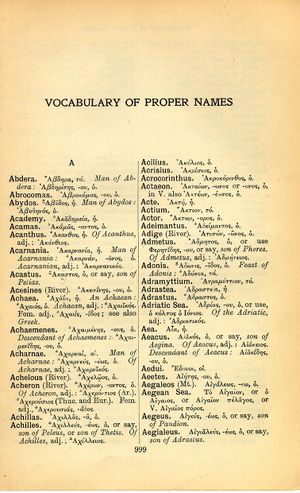Adrastea
τῶν δ᾽ ὀρθουμένων σῴζει τὰ πολλὰ σώμαθ᾽ ἡ πειθαρχία → But of those who make it through, following orders is what saves most of their lives (Sophocles, Antigone 675f.)
English > Greek (Woodhouse)
Ἀδραστεία, ἡ.
Latin > English (Lewis & Short)
Ā̆drastēa: or Ā̆drastīa, ae, f., = Ἀδράστεια.
I The daughter of Jupiter and Necessity (so called from an altar erected to her by Adrastus), the goddess who rewards men for their deeds, and who esp. punishes pride and arrogance: quod nec sinit Adrastea, Verg. Cir. 239: ineffugibilis, App. de Mund. p. 75; Amm. 14, 11.—
II A city of Mysia, later called Parium, Plin. 5, 32, 40, § 141; Just. 11, 6, 10.
Latin > French (Gaffiot 2016)
Adrastēa (-tīa), æ, f. (Ἀδράστεια), surnom de Némésis : Amm. 14, 11, 25 ; 22, 3, 12.
Latin > German (Georges)
Adrastēa (od. -īa), ae, f. (Ἀδράστεια), die Unentfliehbare, Unentrinnbare, Beiname der Nemesis (s. Nemesis), Amm. 14, 11, 25; 22, 3, 12. Apul. de mundo 38. Ps. Verg. Cir. 239.

